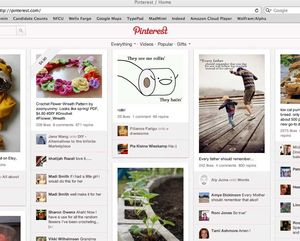Have you spent any time on Pinterest yet? If not, you probably will soon. Pinterest is one of the fastest growing websites on the internet this year, hosting more than 11 million unique visitors per month. 
What is Pinterest? It is a site where members post pictures, images, and artwork on topics that are of interest to them. The name is intended to conjure up a cork pin board where you might post a collage of pictures you find interesting and significant.
Now, imagine you can look at other people’s pin boards, copy images of the interesting things you find on your own board (re-pin), and comment on the things that others have posted. Similar to Google, you can search for images, but instead of just getting a long array of sterile images, each image has a person and comments attached to it.
Here is the question I’d like to consider today: Why did Pinterest suddenly (it was founded in 2008) get wildly popular? What bit of the human existence did the founders of this site discover and successfully tap? And, how can the same ideas be used to make your business more popular?
For some help on this topic, we’ll turn to Dr. Christopher Long and an interview he recently did with Fast Company. Dr. Long makes these observations:
1. Pinterest has mastered the art of sharing. Like Facebook, Pinterest relies on people generating content that interests other users. So, once a critical mass of people comment and re-pin, it reinforces others to generate content.
So what’s different? Pinterest boards are like its users’ personal happiness collages. They represent things that they appreciate, desire, and that express who they are...whether the things are cupcakes, shirtless David Beckham, or an inspirational quotation.
In an ironic way, Long says, this frees many people to be more public about who they really are and who they want to be, because it’s less focused on the kind of personal content that sets off privacy and security alarms.
Dr. Long concludes, “Pinterest is a place where we can demonstrate: ‘If it weren’t for all those mundane things that I do that I post on Facebook, this is what I would be doing and consuming. Here is my real self.’”
2. Pinterest has figured out how to integrate business (brand) interests with personal interests. Facebook has notoriously struggled with the integration of business life and personal life. But Pinterest makes the transition with surprising success—it is currently driving more referral traffic (someone clicks on something in Pinterest that takes them to another, usually commercial, site) than YouTube, LinkedIn, Google, and Reddit...combined.
“Pinterest boards are essentially collections of 'Likes,' the expectation is that users curate these more carefully than they may curate their Facebook Likes. When I pin or re-pin something related to a brand, I am saying that I care about this content enough that I want to hold onto it or that I want to show other people that it is important.
[As people tell me about the things they love], I don’t feel like I’m being sold anything directly, even though each pin will eventually take me to the source. I feel like a service is being provided for me to totally enjoy something that I am passionate about and find images I didn’t know existed."
So, we’ve answered my first two challenge questions...how about the last one: How can these insights be used in your business?
I believe every local real estate office has the opportunity to connect with the citizens and businesses in their area, due to their physical location within the community they serve. And, this need is being largely unmet.
In our next discussion, we’ll explore this idea in more detail. In the meantime, check out Pinterest and tell me what you think of it!
 Editor's Note: This article was written by Ben Hess. Ben is the Founding Partner and Managing Director of Tidemark, Inc. and a regular contributor to WorkPuzzle. Comments or questions are welcome. If you're an email subscriber, reply to this WorkPuzzle email. If you read the blog directly from the web, you can click the "comments" link below.
Editor's Note: This article was written by Ben Hess. Ben is the Founding Partner and Managing Director of Tidemark, Inc. and a regular contributor to WorkPuzzle. Comments or questions are welcome. If you're an email subscriber, reply to this WorkPuzzle email. If you read the blog directly from the web, you can click the "comments" link below.












